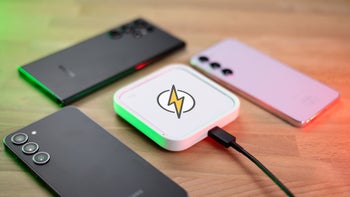Galaxy S23 series wireless charging comparison vs Galaxy S22 series, iPhone 14 Pro/Max

Although it still loses to wired charging in terms of overall speed, there's no beating wireless charging when it comes to ease of use and overall convenience. While if you're in a relative hurry, you are certainly better off using your wired charger when you need to get a quick top-up.
Wireless charging is also associated with slightly more accumulated heat than wired charging, and while in theory heat doesn't have a good effect on battery chemistry, Samsung says that any extra heat accumulated by its official wireless chargers "should not affect the device’s lifespan or performance". If anything, if your phone's battery gets hotter than normal, the wireless charging process will automatically stop, Samsung further reassures.
So, what are the wireless charging speeds of the Galaxy S23 Ultra, Galaxy S23 Plus, and Galaxy S23, which are some of the best Android flagship phones available right now? How do they compare against their predecessors, the Galaxy S22 series, as well as against the best iPhones available right now?
In this article, we will be exploring just how fast the wireless charging is on the Galaxy S23 series compared to the competition.
Read more:
Galaxy S23 series wireless charging specs
Members of the Galaxy S23 series officially support Fast Wireless Charging 2.0, which should technically mean up to 15W of wireless charging input. It's unclear if the same maximum wireless charging speeds are supported with third-party wireless chargers or those default to a lower wattage and speeds. We've reached out to Samsung to shed light on the matter.
Meanwhile, the older Galaxy S22 Ultra, Galaxy S22 Plus, and Galaxy S22 also support Fast Wireless Charging 2.0, so we get 15W of maximum power here as well. The same applies to the iPhone 14 Pro Max and iPhone 14 Pro, both of which support MagSafe wireless charging of up to 15W.
Surely, we have to put the Galaxy S23 series to the test and see how they compare against their predecessors (Galaxy S22 Ultra, Galaxy S22 Plus, Galaxy S22), as well as their best rivals on the US market at the moment—the iPhone 14 Pro Max and the iPhone 14 Pro.
How did we test the wireless charging speeds?
For this comparison, we've used each of the manufacturer-recommended wireless chargers for each phone. We used the official 15W Wireless Charger EP-P2400 to charge up all of the Galaxy S23 and Galaxy S22 participants in this test.
This wireless charger was hooked up to an official 25W Samsung EP-TA800 charging adapter that supports Super Fast Charging. An original Samsung Type C to Type C cable was used to connect the wall adapter with the wireless one.
Meanwhile, we used Apple's 20W USB-C wall adapter in concert with the MagSafe wireless charger to test out how fast the iPhone 14 Pro Max and iPhone 14 Pro charge up wirelessly.
It's important to mention that we started all wireless charging tests on both Galaxies and iPhones from 1%. The "Fast Wireless Charging" option was enabled on all Galaxy phones that we tested, which is its default out-of-the-box state.
Galaxy S23 series wireless charging comparison
UPDATE:The recharge tests for the entire Galaxy S22 and Galaxy S23 series were redone soon after the article was published. Repeated testing showed significantly better wireless charging times for the Galaxy S23 and Galaxy S23 Ultra. The table below lists the results from our second round of testing. Comments in the article have also been updated to reflect the new test results.
| Phone\charge time | In 15 minutes | In 30 minutes | In 45 min | In 1 hour | Full charge |
|---|---|---|---|---|---|
| Samsung Galaxy S23 Ultra | 17% | 31% | 47% | 61% | 1 hour 50 minutes |
| Samsung Galaxy S23 Plus | 17% | 32% | 47% | 63% | 1 hour 49 minutes |
| Samsung Galaxy S23 | 21% | 42% | 62% | 82% | 1 hour 15 minutes |
| Samsung Galaxy S22 Ultra | 15% | 28% | 41% | 54% | 1 hour 56 minutes |
| Samsung Galaxy S22 Plus | 18% | 34% | 50% | 65% | 1 hour 39 minutes |
| Samsung Galaxy S22 | 18% | 36% | 54% | 71% | 1 hour 31 minutes |
| Apple iPhone 14 Pro Max | 15% | 29% | - | 51% | 2 hours 35 minutes |
| Apple iPhone 14 Pro | 20% | 35% | - | 65% | 2 hours 7 minutes |
With the Galaxy S23 Ultra, we don't see any big charging speed improvements in comparison with the Galaxy S22 Ultra. The difference of just six minutes between the two devices is merely marginal. Have in mind that both of these phones come with large 5,000mAh batteries, so such a wireless charging speed is not too shabby at all. A quick 30-minute charge will get you around 30% of battery reserve on both devices, while an hour-long wireless charging will get you a bit over 60% of battery on the Galaxy S23 Ultra and slightly less on the Galaxy S22 Ultra.
The Galaxy S23 Plus with its larger 4,700mAh battery, on the other hand, charges slightly slower than its predecessor, the Galaxy S22 Plus, which came with a 4,500mAh battery on board. Both phones charge up at a similar rate up until the 30-minute mark, but moving forward, the Galaxy S22 Plus finishes this exercise 10 minutes earlier.
Our Galaxy S23 unit, however, totally beats its predecessor and takes the lead from the get-go. No matter how long you leave it on the wireless charger, this latest compact Android powerhouse will charge up quicker than last year's Galaxy S22. A full charge takes an hour and 15 minutes on the Galaxy S23, while the Galaxy S22 requires fifteen minutes extra. It's worth noting that the Galaxy S23 also has a larger 3,900mAh battery in comparison with the 3,700mAh one on the Galaxy S22.
Both the iPhone 14 Pro Max and iPhone 14 Pro charge slower in comparison to their Galaxy competitors. Apple has been conservative with adopting faster charging solutions for its iPhones, so we are not surprised to see more cautious wireless charging speeds on the iPhone 14 Pro Max and the iPhone 14 Pro. Albeit both devices support 15W MagSafe charging, they charge slower than the Galaxy S23 Ultra, Galaxy S23 Plus, or Galaxy S23.
Conclusion
All in all, the Galaxy S23 line delivers similar results to last year's Galaxy S22 series and still beats the iPhone in wireless charging speeds. While we didn't score a significant improvement in terms of charging speeds, it's all in line with the 15W laid out by the Qi standard that all these phones support. The upcoming Qi2 standard that's coming to a flagship phone near you later this year will probably give us noticeably faster wireless charging speeds. In any case, opting to wirelessly charge your phone is mostly a matter of convenience, because it's bound to always lose to its wired counterpart.










Things that are NOT allowed: